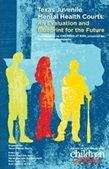 |
One of the library's recent acquisitions, a report published by the Houston nonpartisan advocacy group Children at Risk, takes an in-depth look at Texas' new juvenile mental health courts. These specialty courts are designed to aid juvenile offenders who suffer from mental illness. Their focus is on treatment and rehabilitation rather than incarceration. The report, Texas Juvenile Mental Health Courts: An Evaluation and Blueprint for the Future, begins with a concise overview of these specialized systems. It then focuses on four major courts in Austin, El Paso, Harris County, and San Antonio. For each court, the researchers describe the process juvenile offenders go through, the services the court offers, and the potential outcomes of a case. They also provide demographic and offense statistics. Finally, each court is evaluated on success rates and cost-effectiveness. Individual case histories are included throughout this section, adding a personal touch to the numbers. The report's second section lays out a "blueprint for the future." After a brief overview of the advantages of juvenile mental health courts, the authors offer specific, detailed guidance to policymakers and local leaders who are considering establishing these courts in their communities. The discussion takes readers step-by-step through the process of setting up a mental health court system and is punctuated with real-world examples from the courts described in section one. The authors conclude with policy recommendations from various stakeholders and Children at Risk itself. These recommendations address funding, staffing, and evaluation concerns. Along with the rest of the report, they provide a good starting point for those interested in learning more about this new breed of specialty court. |
The library website will be unavailable due to system maintenance from 6:00 p.m. on Friday, April 26, 2024, through 7:00 a.m. on Monday, April 29, 2024
Legislative Reference Library of Texas
your partner in legislative research
your partner in legislative research

